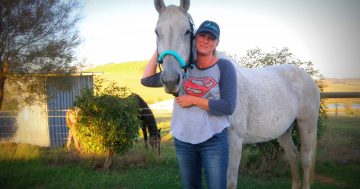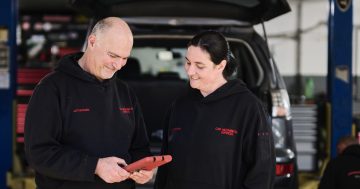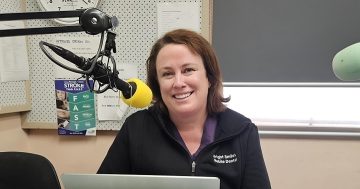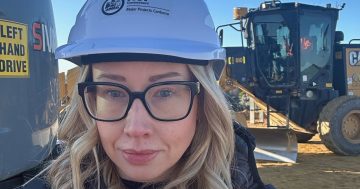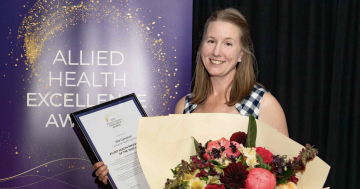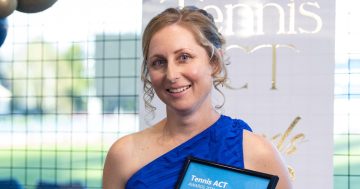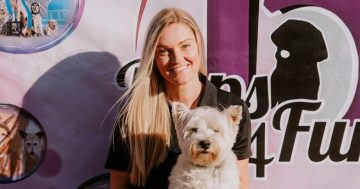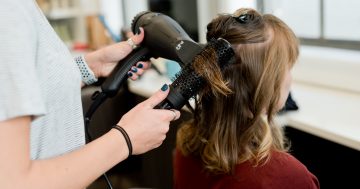
When most people think about a new product startup, they don’t picture it being based in Canberra. And yet local Alix O’Hara, founder of Mashblox, is now a finalist for the NSW/ACT Young Achiever’s Awards, in the WFI Insurance Small Business Achiever Award category. The awards aim to acknowledge, encourage, and promote the positive achievements of young people aged 29 years or under.
Alix believes that Canberra is actually a great place for a startup product. She describes Canberra as a Petrie dish where businesses can test a concept, refine their business model and marketing messages because of the easy access to all sorts of businesses and programs, then scale up to the whole of Australia. But more government supports for entrepreneurs are needed.
Having worked in offices for the private sector, Alix realised she had what it takes to start and manage her own business. You may have read about her business in a 2017 RiotACT article. The inspiration for Mashblox came from watching how small children interact with their food, and her interest in reducing fussy eating and childhood obesity.
“I was out shopping with a friend, and I saw a very independent toddler with an apple,” Alix says. She watched this toddler playing with the apple, dropping it on the ground and picking it up to take another bite (dirt and all). She had also been thinking a lot about the causes of fussy eating, with toddlers having an emotional response to their food and wanting to have more control over one of the few things they actually can control.
By giving children more control over their food, Alix hopes Mashblox will help reduce fussy eating. Universities in the UK are researching children self-feeding and the impact on fussiness and health.
One of the problems with self-feeding is the messiness of it. Babies and toddlers need opportunities to play with textures and tastes, with their hands as well as their mouths, but soft foods are messy, and small children don’t know why they can’t just eat things they’ve found on the floor. Alix came up with a brilliant idea to help small children play food, while at the same time reducing the mess for their parents and keeping the food away from germs. Mashblox are soft silicone blocks that can be filled with healthy foods (the website shows broccoli and fruit inside blocks), that can develop motor function of little hands to get the food out, or that soft foods can be sucked, mushed or bitten out of.
“Mashblox will give them a sense of fun and play without food going everywhere,” Alix explains.
Alix initially thought her idea would be “just a novelty”, but the friendly people at the Griffin Accelerator Program at CBR Innovation Network encouraged her to research other benefits. She says she had always been good at making things, and had done some studies in medical science. With the supportive environment at CBR Innovation Network, she was able to take the next steps towards her own business.
But it wasn’t all smooth sailing from this point. Alix was homeless and couch-surfing when she started her business. She says the biggest hurdle to overcome was believing in her own abilities.
“For as much progress as I’ve made with my business, I’ve made equal progress with myself,” Alix says of the learning process in creating a business and making a life for herself simultaneously.
There were, of course, problems to be solved in developing her product idea. But being part of the CBR Innovation Network gave Alix access to contacts who could help her.
“Erica Hediger from The Creative Element helped with first prototypes, and guided me to the materials most appropriate for my product,” Alix says. “There’s a solution and an expert to help with every problem that you can clearly define.” She then found a manufacturer based in Australia, had her product certified, and started working with University of Canberra and childcare centres to research the impact that fun, playful self-feeding has on small children and their willingness to try new foods. UK Universities and multiple international academics have since expressed interest in the hypothesis and approach, and her goal is to move to the UK as soon as possible to commence trials.
Alix says she got used to being confronted with problems and having to find solutions, but also became more comfortable with not rushing to solve every problem as it comes up.
“I don’t need to solve that one immediately, but let it sit and an answer will come to me,” she says.
“The most important thing was to just start. Nobody that you admire knew every step of the way what to do. You develop the capability you need at each step along the way,” Alix says. “At every step, I visualise the next and reflect on the step just taken.”
Alix says that starting up her business while she was still going through the process of finding a place to live gave her the benefit of learning how capable she is.
“The more mess you have to clean up, the more you are able to work out what you need to change, bit by bit. People that haven’t experienced such difficulty don’t necessarily get that learning opportunity. It builds resilience, resourcefulness, coping mechanisms, and gratitude,” Alix says.
The many references Alix makes to how supportive she found the CBR Innovation Network environment, her mentors at the Griffin Accelerator Program, Canberra Women in Business where she won Young Businesswoman of the Year in 2017, her networks and shareholders show that gratitude is something she feels strongly about.
“I think the balance is starting to shift and women (startup entrepreneurs) are being more supported. I believe if you’re firm enough about something and find the right supportive environment, anything is possible,” she says.
Competing for the WFI Insurance Small Business Award, Alix hopes that the award will help her with next steps for Mashblox, as well as making people more aware of her idea and how it might help people.
“Ultimately, it’s about reducing childhood obesity, while reducing parent stress associated with feeding difficulties,” Alix says. She describes Mashblox as mission-driven, for-profit.
“Profit can be a direct consequence of the positive impact we have on the world.”
In the future, she’d also like to be a role model for other young women looking to run their own business. “It would be good for women to know that they often only engage when they’re 100% ready, but men leap in at 60%,” she says. “This means that if they’ve been thinking about starting a business for a while, they’re probably a lot closer to ready than they realise.”
Because she says that it isn’t possible to know in advance how to solve every problem along the way, or even what all of the hurdles might be, this can hold women back from making a start on their great idea.
To support Alix in the awards process, there is a People’s Choice vote closing midnight on Monday 16 April. Winners will be announced at the Awards Gala Presentation Dinner on Friday 20 April.
Alix is also a Board member of the Women’s Centre for Health Matters.













